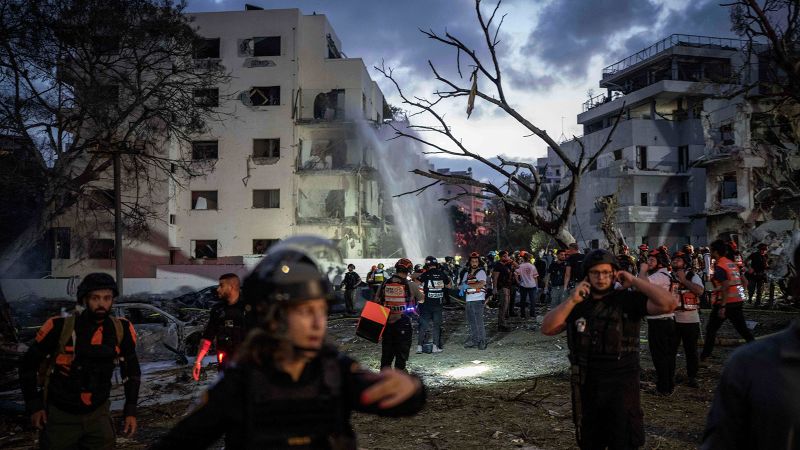As an unprecedented Israeli attack on Iran last week sparks a spiraling conflict between the two enemy states, China has seen an opportunity to cast itself as potential peace broker – and an alternative voice to the United States.
Chinese Foreign Minister Wang Yi took up this mission over the weekend, speaking with both his Iranian and Israeli counterparts in separate phone calls, where Wang decried the attack that sparked latest conflict and telegraphed China’s offer to “play a constructive role” in its resolution.
“China explicitly condemns Israel’s violation of Iran’s sovereignty, security and territorial integrity … (and) supports Iran in safeguarding its national sovereignty, defending its legitimate rights and interests,” Wang said in a call Saturday with Iranian Foreign Minister Seyed Abbas Araghchi, according to Beijing’sofficial readout.
China’s self-described “explicit” opposition to Israel’s attack stands in sharp contrast to the country’s response to Russia’s invasion of Ukraine – which Beijing refused to condemn as it ramped up its close ties with Moscow.
It also underscores the hardening of geopolitical lines that have placed China in opposition to the US across a host of global issues.
Israel launched its aerial attack targeting Iran’s nuclear, missile and military complex early Friday in what Israeli Prime Minister Benjamin Netanyahu said was an operation to “roll back” the Iranian threat to his country’s survival.
Multiple waves of deadly assaults launched by both sides in the days since have seen mounting casualties and raised the risk of a broader regional conflagration that could involve the United States, which has so far only assisted in Israel’s defense against an onslaught on Iranian missiles and drones.
In Beijing’s eyes, all this gives ample reason to be outspoken on a conflict playing out in a part of the world where it has steadily worked to increase its own economic and diplomatic sway, but where experts say its heft as a powerbroker remains limited.
For one, as the Trump administration’s “America First” policy has shaken up the US’ traditional position on the international stage, Beijing sees an opportunity to further expand its clout. That’s especially true in the context of countries across the Global South, where Israel has received stark condemnation over its ongoing assault on Gaza.
Beijing is also a key diplomatic and economic backer of Iran and has moved to further deepen collaboration in recent years, including holdingjoint naval drills, even as it’s sought to balance those ties with its growing relations with countries like Saudi Arabia. Chinese officialslong voiced opposition to US sanctions on Iranand criticized the US withdrawal from the 2015 Iran nuclear deal, while accusing Washington of being a source of instability and tensions in the region.
Wang took veiled aim at the US in his call with his Iranian counterpart Saturday, according to the Chinese readout of the call, saying that “China also urges the countries that have influence over Israel to make concrete efforts to restore peace.”
“China is ready to maintain communication with Iran and other relevant parties to continue playing a constructive role in de-escalating the situation,” he added.
Speaking to Israeli Foreign Minsiter Gideon Sa’ar on Saturday, Wang said China “urged both Israel and Iran to resolve differences through dialogue” and added “that China is willing to play a constructive role in supporting these efforts,” a Chinese readout said.
Beijing is unlikely to see benefits from the deepening of tensions in the region, which it relies on for energy and where it has looked to show itself as an emerging powerbroker. For example, it took on a surprise role in facilitating a diplomatic rapprochement between archrivals Saudi Arabia and Iran in 2023.
It’s unclear what role Beijing could play in the resolution of the current conflict, including how much leverage Beijing has over Tehran, even as lawmakers in Washington have warned of adeepening “axis” between China, Iran, Russia and North Korea.
China remains by far Iran’s largest energy buyer, though it has not reported purchases of Iranian oil in its official customs data since 2022, according to analysts. This year, the USsanctioneda handful of Chinese entities for their alleged role in trading Iranian oil, and Chinese-made chemicals needed to produce missile fuel have been delivered to Iran in recent months, CNNreporting shows.
But when it comes to managing the direction of this escalation of an entrenched regional conflict, chances are that players both within the Middle East and the US – which plays a key role in regional security – will ultimately drive that effort.
Trump on Sunday posted on social media that Iran and Israel “will make a deal,” adding that “many calls and meetings” were “now taking place,” without providing details.
But the US president had also suggested another potential leader could have a role to play brokering peace: Vladimir Putin, with whom Trump said he discussed the escalating situation on Saturday.
In aninterviewwith ABC News, Trump said he was open to the Russian leader, whose forces invaded Ukraine and who has resisted a US-brokered ceasefire in that conflict, serving as a mediator – another sign of thewarming ties between Washington and Moscow, which maintains close relations with Tehran and has condemned Israel’s attack.
“I would be open to it,” Trump said. Putin “is ready.”
